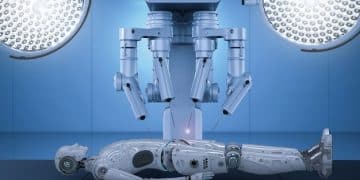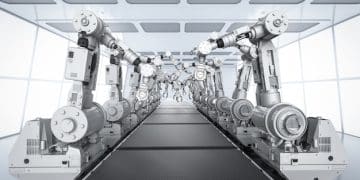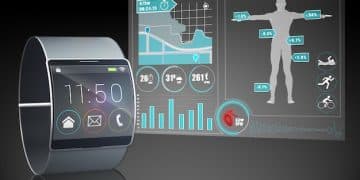The Future of AI in US Healthcare: 5-Year Predictions
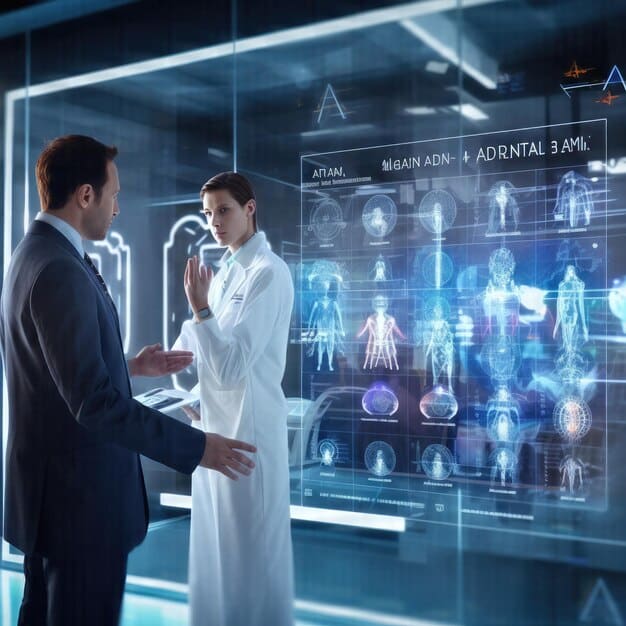
The future of AI-powered healthcare in the US over the next five years is poised for transformative growth, marked by advanced diagnostics, personalized treatment plans, and improved operational efficiencies, ultimately reshaping patient care and clinical practices.
The landscape of healthcare in the United States is on the cusp of an unprecedented transformation, driven by the rapid advancements in artificial intelligence. As we look ahead, The Future of AI-Powered Healthcare in the US: Predictions for the Next 5 Years suggests a seismic shift in how diseases are diagnosed, treatments are administered, and health systems operate. This isn’t merely about incremental improvements; it’s about fundamentally rethinking the delivery of care.
AI in Diagnostics: Precision, Speed, and Accuracy
In the coming five years, AI’s role in diagnostics will transcend current capabilities, becoming an indispensable tool for clinicians. Its ability to process vast amounts of medical data at speeds unimaginable to humans means earlier detection and more precise diagnoses, fundamentally altering prognoses for countless patients.
Advanced Imaging Analysis
AI algorithms are already demonstrating superior pattern recognition in medical imaging. Expect this to accelerate, leading to AI systems that can identify subtle anomalies in X-rays, MRIs, and CT scans with remarkable accuracy, often before human radiologists. This will drastically reduce diagnostic errors and improve patient outcomes.
- Augmented radiological interpretation: AI assistants flagging potential issues.
- Early cancer detection: Identifying microscopic tumor variations.
- Neurological disorder diagnosis: Uncovering early signs of Alzheimer’s or Parkinson’s.
Enhanced Pathological Examination
Digital pathology, combined with AI, will revolutionize how tissue samples are analyzed. AI can scan and interpret biopsies, classifying disease types and grading their severity with unprecedented consistency. This consistency is crucial for both research and clinical practice, ensuring every patient receives the most accurate assessment.
- Automated slide analysis: Speeding up complex pathological reviews.
- Biomarker identification: Pinpointing genetic indicators for targeted therapies.
- Reduced human error: Minimizing subjective interpretation variations.
The integration of AI into diagnostic workflows promises not just efficiency but a new era of diagnostic precision, where diseases are caught earlier, understood better, and treated more effectively. This shift will empower healthcare providers with insights previously unattainable, leading to more informed decision-making and ultimately, better patient care nationwide.
Personalized Medicine: Tailoring Treatment to the Individual
One of the most profound impacts of AI in US healthcare will be the widespread adoption of personalized medicine. Moving away from a “one-size-fits-all” approach, AI will enable treatments uniquely tailored to an individual’s genetic makeup, lifestyle, and environment, promising higher efficacy and fewer side effects.

Genomic-Driven Therapies
The explosion of genomic data, coupled with AI’s analytical power, means that within five years, oncologists and other specialists will routinely use AI to sift through a patient’s genetic profile. This allows for the selection of drugs and therapies that are most likely to be effective, bypassing those that might be ineffective or cause adverse reactions.
- Precision oncology: Matching specific cancer mutations with targeted drugs.
- Pharmacogenomics: Predicting drug response based on genetic variations.
- Preventive genomics: Identifying predisposition to diseases for early intervention.
AI-Powered Drug Discovery and Development
The traditional drug discovery process is famously lengthy and expensive. AI is poised to dramatically accelerate this. By simulating complex molecular interactions and predicting drug efficacy, AI can identify promising compounds faster, reducing development costs and bringing life-saving medications to market more quickly. This will directly translate to a wider array of personalized treatment options available in the US.
The shift towards personalized medicine isn’t just about advanced technology; it’s about recognizing the unique biological tapestry of each individual. AI acts as the loom, weaving together vast datasets to create a treatment plan that fits like a glove, optimizing health outcomes and minimizing unnecessary burdens inherent in generalized care approaches.
Operational Efficiency: Streamlining Healthcare Systems
Beyond clinical applications, AI is set to revolutionize the operational backbone of US healthcare. By automating administrative tasks, optimizing resource allocation, and enhancing cybersecurity, AI will create more efficient, resilient, and patient-centric health systems across the nation. This will allow medical professionals to dedicate more time to direct patient care rather than cumbersome paperwork.
Automating Administrative Burdens
Healthcare professionals spend a significant amount of time on administrative tasks, from scheduling appointments to managing electronic health records (EHRs). AI-powered virtual assistants and automation software will absorb much of this workload. This means fewer errors, faster processing, and most importantly, more clinician time freed up for patients. Imagine a future where medical billing and insurance claims are processed seamlessly, reducing frustrating delays for both providers and patients.
- Smart scheduling systems: Optimizing appointment times and reducing no-shows.
- Automated medical coding: Ensuring accuracy and compliance in billing.
- AI-driven documentation: Transcribing and summarizing patient interactions into EHRs.
Supply Chain and Resource Optimization
Managing medical supplies, equipment, and even bed occupancy is a complex logistical challenge within hospitals. AI algorithms can analyze real-time data to predict demand, optimize inventory levels, and efficiently allocate resources. This not only cuts down on waste but ensures that critical supplies and personnel are available precisely when and where they are needed, enhancing overall responsiveness in healthcare delivery.
The impact of AI on operational efficiency will be far-reaching, improving everything from the patient intake process to discharge planning. By creating a more streamlined and responsive healthcare environment, AI addresses long-standing bottlenecks, making the entire system more agile and effective for the millions of Americans it serves daily.
Enhanced Patient Engagement and Remote Monitoring
The next five years will see AI profoundly transforming patient engagement and remote monitoring, bridging the gap between clinical visits and daily life. This evolution promises to shift healthcare from a reactive model to a proactive, continuous care paradigm, empowering patients and enabling providers to offer more personalized and timely interventions.
AI-Powered Virtual Health Assistants
Patients will increasingly interact with AI-driven virtual assistants for routine inquiries, appointment scheduling, and even preliminary symptom assessment. These tools can provide reliable health information, guide patients through self-care protocols, and determine when a physical consultation is necessary, reducing the burden on clinics and emergency rooms for non-critical issues. Such assistants will operate 24/7, offering continuous support and information, which is particularly beneficial for those in remote areas or with limited access to immediate care.
- Symptom checkers: Providing initial assessments and directing patients to appropriate care levels.
- Medication adherence reminders: Ensuring patients take prescriptions as directed.
- Health education delivery: Offering personalized information based on patient profiles.
Smart Wearables and Continuous Monitoring
The proliferation of wearable technology, already significant, will be supercharged by AI. These devices will move beyond basic fitness tracking to sophisticated health monitoring, continuously collecting vital signs, activity levels, and even early indicators of potential health issues. AI will analyze this torrent of data, flagging anomalies and alerting both patients and caregivers, facilitating early interventions and preventing acute episodes.
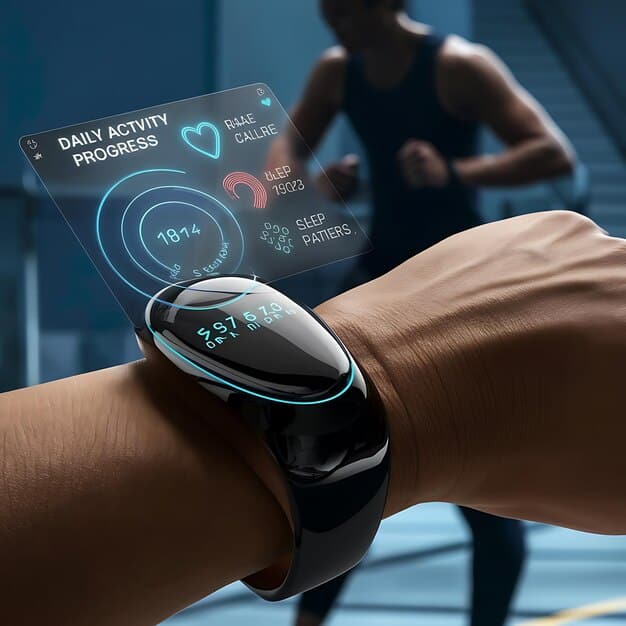
Consider the elderly or those with chronic conditions; continuous AI monitoring can detect subtle changes that might otherwise go unnoticed, providing peace of mind and significantly improving the management of their health. This proactive approach will redefine how chronic diseases are managed and allow for real-time adjustments to care plans, making healthcare truly responsive to an individual’s evolving needs.
The integration of AI into patient engagement and remote monitoring represents a monumental leap towards holistic, preventative care. It empowers individuals to take a more active role in their health management while providing healthcare providers with unprecedented real-time insights, fostering a more connected and responsive healthcare ecosystem across the US.
Addressing Ethical Considerations and Regulatory Frameworks
As AI’s presence in US healthcare expands, so too does the imperative to establish robust ethical guidelines and regulatory frameworks. The rapid pace of technological innovation demands a proactive approach to ensure patient safety, data privacy, and equitable access, while also fostering trust in these powerful new tools.
Data Privacy and Security
The collection and analysis of vast quantities of sensitive patient data are central to AI’s utility in healthcare. This necessitates stringent measures to protect against breaches and misuse. Future regulations will likely focus on enhanced encryption, anonymization techniques, and clear consent protocols, ensuring that patient information remains secure and is used responsibly. Transparency in how AI algorithms process data will also be crucial for maintaining public confidence.
- HIPAA compliance evolution: Adapting existing regulations to AI data handling.
- Blockchain for data integrity: Exploring decentralized ledgers for secure record-keeping.
- Patient data ownership: Defining rights and access control for health information.
Bias in AI Algorithms
AI algorithms are only as unbiased as the data they are trained on. Historical healthcare data often reflects existing societal biases, which, if unaddressed, can lead to disparities in AI-driven diagnoses and treatment recommendations for certain demographic groups. Over the next five years, significant effort will be directed towards developing diverse datasets and auditing algorithms to ensure fairness and equity in their application, preventing the perpetuation of health inequalities.
Navigating the ethical landscape of AI in healthcare is not merely a legal or technical challenge; it’s a societal one. Striking the right balance between innovation and protection will be critical to realizing AI’s full potential as a force for good in the US healthcare system. This involves ongoing dialogue between policymakers, healthcare providers, technologists, and the public to shape a future where AI benefits all, fairly and securely.
AI Integration in Medical Education and Training
The impending surge of AI into US healthcare necessitates a corresponding evolution in medical education and training. Future healthcare professionals will not only need to understand AI’s capabilities but also how to effectively collaborate with these intelligent systems, transforming the very nature of medical practice and learning.
Curriculum Modernization
Medical schools and residency programs will increasingly integrate AI principles, data science, and computational thinking into their curricula. This isn’t about training doctors to be software engineers, but rather to be AI-literate clinicians who can critically evaluate AI outputs, understand their limitations, and leverage them for better patient care. The emphasis will shift from rote memorization to analytical skills, problem-solving, and interpreting complex data through AI insights.
- Introduction to machine learning concepts: Understanding how AI learns.
- Interpreting AI diagnostic reports: Clinical application of AI outputs.
- Ethical considerations of AI in medicine: Navigating responsible use.
Simulation and Virtual Reality (VR) Training
AI-powered simulations and VR environments will become standard tools for medical training. These platforms can offer highly realistic scenarios for surgical procedures, diagnostic challenges, and patient interactions. AI can provide personalized feedback, track learning progress, and adapt scenarios to individual trainee needs, creating a more efficient and effective learning experience without risking patient safety.
The professional development of current healthcare staff also requires attention. Continuous learning modules and workshops will be crucial to upskill practicing physicians, nurses, and allied health professionals on new AI tools and workflows. This commitment to ongoing education will ensure a smooth transition and maximize the benefits of AI integration across all levels of the US healthcare system, fostering a generation of healthcare providers who are not just users of technology, but skilled collaborators with it.
| Key Point | Brief Description |
|---|---|
| 🤖 AI Diagnostics | AI will enable faster, more accurate disease detection via advanced image and pathological analysis. |
| 🧬 Personalized Medicine | Treatments will be tailored based on individual genomics and AI-accelerated drug discovery. |
| ⚙️ Operational Efficiency | AI will streamline administrative tasks and optimize resource allocation in healthcare systems. |
| 💬 Patient Engagement | AI will enhance patient interaction via virtual assistants and continuous remote monitoring. |
Frequently Asked Questions About AI in US Healthcare
AI will revolutionize diagnostics by offering unprecedented precision and speed. Advanced algorithms can analyze medical images and pathological samples with superior accuracy, identifying minute anomalies often missed by the human eye. This leads to earlier disease detection and more tailored treatment plans, significantly improving patient outcomes across various medical fields.
Within the next five years, AI will be central to personalized medicine, enabling genomic-driven therapies and accelerating drug discovery. By analyzing individual genetic profiles, AI can predict drug responses and identify the most effective treatments, moving healthcare beyond generic approaches towards highly individualized care that maximizes efficacy and minimizes adverse effects for each patient.
AI will significantly enhance operational efficiency by automating administrative tasks such as scheduling, billing, and medical coding. It will also optimize resource allocation, including supply chain management and bed occupancy. This streamlining will reduce human error, cut costs, and most importantly, free up healthcare professionals to focus more on direct patient care, thereby improving overall system responsiveness.
No, AI is not expected to replace healthcare professionals. Instead, it will serve as a powerful tool to augment their capabilities. AI will handle repetitive, data-intensive tasks, providing clinicians with more accurate information and insights. This allows healthcare providers to focus on complex decision-making, patient interaction, and empathetic care, ultimately enhancing the quality and efficiency of medical services.
Key ethical challenges include ensuring robust data privacy and security to protect sensitive patient information from breaches. Another major concern is addressing potential biases in AI algorithms that could lead to healthcare disparities. Developing fair and equitable AI systems, along with transparent regulatory frameworks, will be crucial to maintain public trust and ensure responsible AI adoption in healthcare.
Conclusion
The journey of AI integration into US healthcare over the next five years promises to be nothing short of revolutionary. From enabling unprecedented diagnostic precision and fostering truly personalized medicine to streamlining complex operations and enhancing patient engagement, AI is set to redefine the very fabric of medical practice. While formidable challenges remain, particularly in the realm of ethics and regulation, the trajectory is clear: AI will empower healthcare professionals with tools to deliver more effective, efficient, and equitable care. The future points towards a healthcare system that is more proactive, data-driven, and ultimately, profoundly more human-centric, where technology serves as a catalyst for better health and well-being nationwide.

